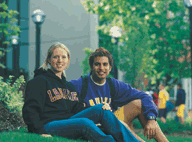Master of Arts in Theology
The Master of Arts (MA) in Theology is designed for students interested in a faith-based, graduate-level approach to spiritual care and psychotherapy, academic work in theology, and/or professional development related to theology.
There are two fields to this program:
Spiritualities and Community Engagement
The Spiritualities and Community Engagement field provides students with a spiritualities-informed reflective approach to working with communities. It also enables students to develop community leadership skills through higher education and applied practice. Students study diverse spiritualities and engage in community service-related initiatives. Graduates of this field of study may be able to pursue further academic work or a career or vocation in community sectors influenced by theological/spiritual/religious visions.
Spiritual Care and Psychotherapy
The Spiritual Care and Psychotherapy field is a unique form of therapy that integrates spiritual/religious resources as well as counselling theory into clinical practice. Graduates of this field of study may be able to pursue professional accreditation with external accrediting bodies once both academic and other criteria required by the accrediting bodies are completed. The Spiritual Care and Psychotherapy field is accredited by the College of Registered Psychotherapists of Ontario. The student is responsible to manage their course selection and application for accreditation. This program provides academic preparation but not professional certification.
The MA program commences in September annually. Applicants are assessed on the basis of the application materials submitted (including official transcripts, references, writing sample and a personal statement). These materials will not be returned to the applicant. The applicant may be invited for a personal interview.
The requirements for admission include a bachelor's degree (normally with a minimum grade point average of B) from a recognized accredited university or university college. All applicants (except those applying for the MA in Theology in the field of Spiritualities and Community Engagement) will be required to complete a computer-based test (CASPerTM) as part of the selection process. There is a fee to the student for taking this test.
Students take 11 required core courses and 5 theology electives.
Required courses:
TH503A - Survey of the Hebrew Scriptures
TH530E - Foundations of Spiritualities
TH560G - Foundations of Ethical Community Engagement
TH644A - Indigenous Wisdom and Methodologies
TH645A - Intersectionality: Interfaith and Intercultural Perspectives
One of the following Christian Faith Traditions courses:
TH502A - Critical Analysis of Biblical Texts: Introduction
TH503C - Survey of the New Testament
TH530A - Introduction to God and Theological Reflection
TH530B - Introduction to Jesus and Salvation
One of the following Islamic Traditions courses:
TH503E - Reading and Interpreting the Qur'an (in translation)
TH664B - Islamic Spirituality (Sufism) and Psychotherapy
One of the following Asian Traditions courses:
TH503F - Survey of Sources in Asian Wisdom Traditions
TH503H - Buddhist Discourses on Care
Two of the following courses that engage critical approaches and experiential learning:
TH530C - Introduction to the Spirit and Community
TH560E - Spiritual Formation and Nurturing Faith A
TH641K - Earth-based Spirituality
TH643D - Questioning Ability
TH645B - Women, LGBTQ2SIA+, Justice and Spirituality
TH648D
Research courses:
TH697 - Integrative Project
(Students can petition to do TH698* - Major Research Project in Theology or TH699 - Thesis in Theology instead of TH697 - Integrative Project. In such cases, students taking TH698* - Major Research Project in Theology will need 4 electives and students taking TH699 - Thesis in Theology will need 2 electives.
Five electives selected in consultation with the program director.
Students take 14 required courses and 2 counselling elective courses.
Sacred Scriptures - take two:
TH503A - Survey of the Hebrew Scriptures
TH503C - Survey of the New Testament
TH503E - Reading and Interpreting the Qur'an (in translation)
Theology/Wisdom Traditions - take all:
TH530A - Introduction to God and Theological Reflection
TH644A - Indigenous Wisdom and Methodologies
TH645A - Intersectionality: Interfaith and Intercultural Perspectives
plus one of:
TH530B - Introduction to Jesus and Salvation
TH530C - Introduction to the Spirit and Community
TH503F - Survey of Sources in Asian Wisdom Traditions
Counselling Theory - take one:
TH663M - Family Therapy Overview
TH663Z - Theory of Change
TH664O - The Neuroscience of Psychotherapy
Take all of:
TH663V - Human Development
TH663Y - Assessment
TH664H - Professional Studies and Ethics
TH664L - Pre-Practicum, and one of:
TH664M* - Practicum (Spiritual Care and Psychotherapy) or TH652A* - Supervised Pastoral Education I: Theory and Practice of Spiritual Care (both 1.0 credit)
Counselling Electives - take two (can include any of the other courses listed above not taken as a required course):
TH663A - Grief
TH663D - The Aging Process
TH663F - Couple and Family Dynamics
TH663U - Unique Healing Alternatives For Adolescents
TH663X - Addiction, Mental Health and Spirituality: Clinical Approaches
TH664B - Islamic Spirituality (Sufism) and Psychotherapy
TH664I - Qualitative Research
TH664P - Mindfulness and Psychotherapy
TH664T - Trauma and Theodicy
TH761G - Therapeutic Relationships






